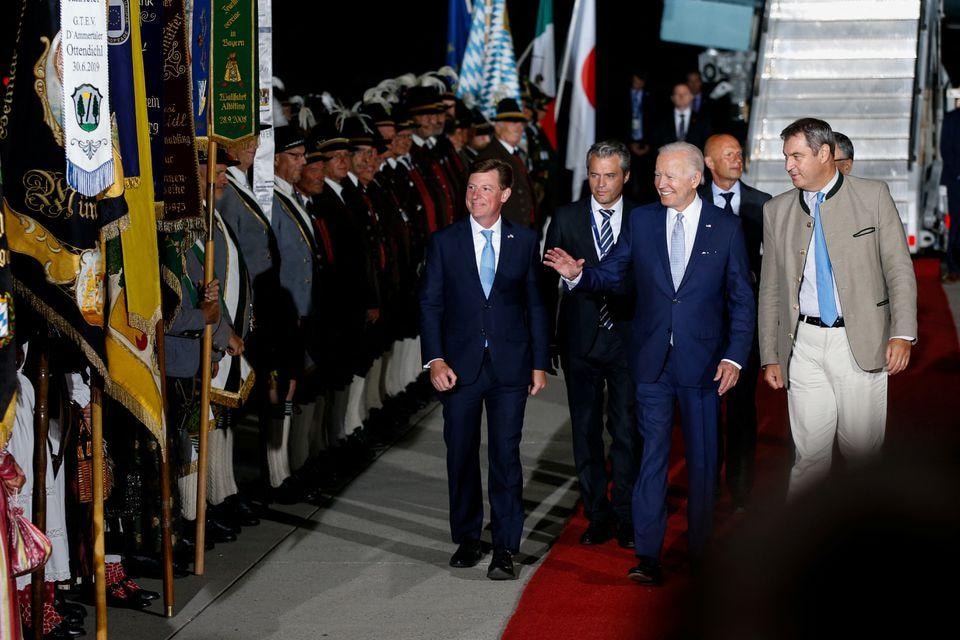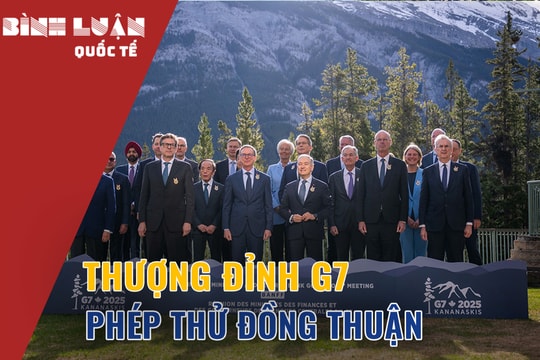Just after the summit opened, G7 announced a ban on gold imports from Russia.
(Baonghean.vn) - On June 26, according to Reuters news agency, members of the Group of Seven (G7) countries announced a ban on gold imports from Russia. At the same time, the G7 summit officially opened in the context of war in Ukraine, energy shortages and food crisis.
 |
US President arrives in Germany to attend the G7 summit opening on June 25. Photo: Reuters |
The move, by the UK, US, Japan and Canada, is part of an effort to tighten sanctions against Moscow and cut off funding for the special military operation that Russian President Vladimir Putin has been carrying out in Ukraine for more than four months.
British Prime Minister Boris Johnson said in a statement: "The measures we are announcing today will hit Russian oligarchs squarely... We need to cut off the finances of the Putin regime. Britain and its allies are doing just that."
A senior US government representative said the G7 will make an official announcement on the ban on gold imports next Tuesday.
“This is Russia's main export, its main source of income and its ability to trade with the global financial system,” the official said.
Last year, Russia's gold exports were worth 12.6 billion pounds ($15.45 billion) and according to the British government, wealthy Russians have been buying gold bars to cushion the financial impact of Western sanctions.
Along with the gold import ban, a German government source said G7 leaders also held "really constructive" talks on the possibility of setting a price cap on oil imports from Russia.
Message of solidarity
The three-day summit is taking place in an even darker context than last year, when the leaders of Britain, Canada, France, Germany, Italy, Japan and the United States met for the first time since the COVID-19 pandemic began, Reuters reported.
Soaring global energy and food prices are hitting economic growth in the wake of the conflict in Ukraine, and the United Nations has warned of an "unprecedented global hunger crisis".
Other issues such as climate change, an increasingly assertive China and the rise of authoritarianism are also expected to be on the agenda of the G7 summit.
G7 leaders are expected to show unity on the front in support of Ukraine and pressure on the Kremlin, but they will want to avoid sanctions that could fuel inflation and worsen the living standards crisis already affecting their citizens.
"The key message from the G7 will be unity and coordinated action," an EU official said.
G7 leaders are also expected to discuss ways to deal with rising energy prices and replace oil and gas imports from Russia.
The summit is also an opportunity for German Chancellor Olaf Scholz to demonstrate more decisive leadership on the Ukraine crisis.
Mr Scholz has pledged to revolutionise German foreign and defence policy after Russia launched its military offensive in February, promising to boost troops and send weapons to Ukraine. But critics have accused him of inertia and sending mixed messages.
Global partners
This year, Mr. Scholz has invited Senegal, Argentina, Indonesia, India and South Africa as partner countries to attend the summit.
Many countries in the Southern Hemisphere are concerned that Western sanctions will cause further indirect damage.
An EU official said the G7 countries would stress to their partners that the spike in food prices was a result of Russia's actions and not any sanctions targeting food.
The official said the war in Ukraine should not be seen as a local issue, but rather as a question mark over the post-World War II world order.



